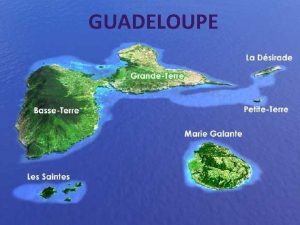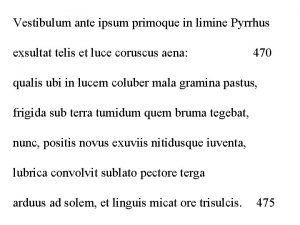1 Camp Meeting Guadeloupe Pyrrhus 4 of 15































- Slides: 31

1 Camp Meeting Guadeloupe Pyrrhus 4 of 15 Tess Lambert April 2019

We’ve been studying Acts 27 and looking at the history of the two ships. We are going to refer back to that study often. Many of the things we discuss, can be found in that study, at least traced back. Where it took us, was into a study of the Ko. S. Because when we looked at this ship, we identified the South wind that preceded the East wind. We also began to consider the number 273, and it took us into history, to 273 BC. Adramyttiu TOE “cut out” m “Abide in death” 2 FP 1 A Ceasar ea Panium/ MC Cypress 911 Sidon 4 th Felix/Festus= USA (Reagan/Bush) Agrippa SDA 273 Myra Lycia ‘ 6 Bitterness harvest Argos US A USA UN UN USA UN Dictatorship 126 1 Wheat USA Adventis m 4 th refreshi ng Alexandria “protector or defender of the people” Alexandria Overturn A nation made up of every tribe Cilicia Pamphyl ia 4 th Myra Lycia SL Bitterness Extracting bright white harvest 1863 Cnide s ‘ 65 Crete Salmon e East wind 9/11 Euroclydo n TOE 1989 Lase a ‘ 91 wise Raphi a MN S 1 Paul “Chief Prince” Aristarchus “Holy Spirit” Luke Panium 27: 27 MC 2 3 Melita X Paul is master of the ship Oct 22 Shipwrec k 14 th night 20 Fathoms = 1440 in+ 15 Fathoms = 1080 in= 2520 2

In the story of Acts 27, that number 273 is found between the way marks of Panium and Sunday Law. Where we took it into history we found 273 BC is located between Panium and Sunday Law, and when we look at the battle of Panium in that history, not the battle of Panium of Daniel 11, but how its illustrated with the Pyrrhic war, we found that there had been a war between the King of the North and the King of the South. This was over the control of the whole of the Italian peninsula. It's Rome that took the North and is now trying to take the South, and as we read, because of this Pyrrhic war, the ancient world stood up and took notice of the rise of Rome, they began to form a diplomatic relationship with Rome. It's a direct cause and affect, the rise of Pagan Rome, into global attention, and is the result of the war with the King of the South. We identified that the King of the South is Pyrrhus. We're going to go into a couple of different perspectives. We're going to prove this role of the King of the South in our time occurs in 2 parts, an alpha and omega. So we want to take Pyrrhus or the King Adramyttiu TOE “cut out” m “Abide in death” 2 FP 1 A Ceasar ea Panium/ MC Cypress 911 Sidon 4 th Felix/Festus= USA (Reagan/Bush) Agrippa SDA 273 Myra Lycia ‘ 6 Bitterness harvest Argos US A USA UN UN USA UN Dictatorship 126 1 Wheat USA Adventis m 4 th refreshi ng Alexandria “protector or defender of the people” Alexandria Overturn A nation made up of every tribe Cilicia Pamphyl ia 4 th Myra Lycia SL Bitterness Extracting bright white harvest 1863 Cnide s ‘ 65 Crete Salmon e East wind 9/11 Euroclydo n TOE 1989 Lase a ‘ 91 wise Raphi a MN S 1 Paul “Chief Prince” Aristarchus “Holy Spirit” Luke Panium 27: 27 MC 2 3 Melita X Paul is master of the ship Oct 22 Shipwrec k 14 th night 20 Fathoms = 1440 in+ 15 Fathoms = 1080 in= 2520 3

We read in Daniel 8 and 11: 4 and see that the death of Alexander is described as the breaking of the horn. Then it says that there are 4 horns that rise up, the 4 generals who take over the 4 directions of the compass, north south east west. But they are not placed until 301 BC, in the Battle if Ipsus. The process by which this Empire is divided in these 4 regions, occurs over 22 years, and 4 wars known as the Diadochi wars. Until we come to the Battle of Ipsus, we have Seleucus, Ptolemy, Cassandra, and Lysimachus. From 1 horn to 4 horns. So in this study, we are picking it up from the 4 thhorn, or Diadochi war. The 3 rdand the 4 th are our 4 generals against 5 th. That 5 thgeneral is Antigonus, the most powerful general of this time. And as we study further, Daniel had a good logic to build this verse in this fashion, to go from just Alexander to the 4 generals. Because this 5 thgeneral Antigonus, is continuing the work of Alexander the Great. So all through this history, you still have a notable general of Alexander, Antigonus, that is working to unite the Greek empire after this Dynasty. And it’s not until the death of Antigonus at 301, that the empire is permanently divided, with no hope of unity. So when Daniel under inspiration, directed the writing of this history, it makes sense and there is logic behind it, to go from just 1 to 4, because Alexander and Antigonus are doing the same work. Not until the death of Antigonus, that the 22 yrs Alexande Died r 323 bc The Great 22 yrs Diodochi Wars Seleucus Ptolemy Cassander Lysimachu s -323 Alexande r the Great Battle of Ipsus Antigonus 15 Ipsus -301 -298 Antigon us ý Cassand er ý Pyrrhus + Demetrius But our main subject for the whole of this message, focuses not on the King of the North, but the king of the South. It's Pyrrhus, and he becomes involved in the 4 th. Diadochi war. So if we were to trace the history of this 4 thwar, we began to do that. We saw that Antigonus is not alone. He's fighting alongside his son, Demetrius. And Demetrius becomes an important figure in the history of Pyrrhus. 4

10 -307 -303 -301 Ipsus 317 Cassand er Athens Demetriu s Frees Athens Alliance Demetriu s Pyrrhus Seleucus Cassander Lysimachus 3 allies Vs Antigonu Demetrius → Pyrrhus In 307 BC, Demetrius begins the 4 th. Diadochi war. He takes an army into Athens, and he frees the city. Ten years before, Cassander placed a puppet government. , ruling Athens as a dictatorship. And in 307, 10 years later Demetrius frees the city, and they proclaim him a god. As you can imagine Cassander was not pleased. He goes back into an alliance with the other three generals, and this war is sparked from that incident. They all begin to fight again, our allies against Antigonus and his son Demetrius. In 303 BC, Demetrius goes into an alliance, with Pyrrhus’s sister marries Demetrius, and he becomes involved in this war. This is where Pyrrhus comes into history. This Alliance in utilized 2 years later at the Battle of Ipsus in 301 BC. We saw that 3 of our generals, Lysimachus, Seleucus, and Cassander come against Antigonus, his son Demetrius who is being supported by Pyrrhus, he's fighting as his general. This is Dan 11: 4, the division of Alexander’s empire, into the North, East, West, South. 5

10 -307 -303 -301 Ipsus -298 Seleucus Cassander Lysimachus 3 allies Vs Antigonu Demetrius → Pyrrhus Cassand er dies 317 Cassand er Athens Demetriu s Frees Athens Alliance Demetriu s Pyrrhus Then we discussed how long it remained divided into four. In the history of the 3 rdand 4 th, you have 15 -16 years, where the empire is divided into 5. And if Daniel wasn't just taking a specific thread to make a certain prophetic point, it would make more sense to say this kingdom was divided into 5 horns not 4. But Daniel is making one point and we are making another. And this empire was only divided into 4 for about 3 years. A few years later, about 298, Cassander dies, and now you have just 3 horns. Just a few years after Ipsus he dies of natural causes. He left his eldest son in charge of the kingdom. His eldest son died, and upset all the plans for that Dynasty. So Cassander dies and quickly after his eldest son dies. This left the 2 younger brothers Antipater and Alexander, to fight over the kingdom, and this very quickly turns violent. So Cassander’s 2 youngest sons are fighting over that empire. The youngest son writes to 2 people, and asks for help taking his fathers empire. 6

We drew a map of Italy. When they divided into the North, East, South, West, who had the West? Cassander. So the area they are fighting over is the land that surrounds Epirus, which is the country of Pyrrhus. This is what the 2 younger brothers are fighting over, Macedonia. And the youngest one writes to Pyrrhus, and asks for help to regain the throne of Macedonia. He doesn't just write to Pyrrhus, he also writes to Demetrius. Antigonus has died, Demetrius has his own Navy and his own territory and he is still a king like all the others. The youngest son of Cassander asks both Demetrius and Pyrrhus to help him regain the throne in Macedonia. Pyrrhus gets there first because he is the closest, and he places that youngest son on the throne. And as a reward this son of Cassander gives Pyrrhus extra territory, expanding his territory of Epirus into Macedonia. But Demetrius didn't want to loose this opportunity to become involved in this affair and expand his kingdom. He arrives after the job is already done, he stays around pretending to be a friend, and then when he sees an opportunity he kills Cassander’s son, the king of Macedonia. And he takes all of it for himself. KN Rome l KS l l l l l l l Tarentu ml l Thurri Pyrrhus 7

This was a different approach than Pyrrhus just expanded his kingdom and Demetrius wanted all of it so he killed the son of Cassander and took it. This is how Cassander is wiped off the map of history, his lineage does not continue this story, because this kingdom is taken over by another king, Demetrius. KN Rome l KS l l l l l l l Tarentu ml l Thurri Pyrrhus This is how we see the story of these 4 generals, in Dan 11: 4 going down to 2 generals in vs 5. Demetrius is still involved in that break down. This country of Macedonia has been divided by these 2 allies Pyrrhus and Demetrius. And this upset Pyrrhus. He placed the king on the throne, and now he has seen Demetrius kill his ally, and now Demetrius who is supposed to be his ally as well, is extremely powerful, the king of Macedonia, as well as much of Greece which is down below on the map and now has all the territory surrounding Pyrrhus’s country. And even with your allies you want some distance, a buffer zone. Pyrrhus wanted some space between Demetrius’s kingdom, especially since he has now become so much more powerful. 8

So this division of Macedonia begins to break down the alliance that had existed between Pyrrhus and Demetrius at the battle of Ipsus. Also Pyrrhus’s sister who had married Demetrius is a part of this alliance, died. So their alliance was extremely damaged. This is first illustrated in 291 BC, a number of years later. Demetrius is becoming more and more powerful. Demetrius is king of Macedonia and has power over the whole kingdom and much of Greece. He has those city states, like Athens and others. 10 -307 -303 317 291 -301 Ipsus Macedonia divided Demetriu s Frees Athens Alliance Demetriu s Pyrrhus Seleucus Cassander Lysimachus 3 allies Vs Antigonu Demetrius → Pyrrhus 9

Demetrius was having some trouble down in Greece, he was besieging a city, and Pyrrhus felt it was the right time to strike to try and weaken his ally. While Demetrius is down in Greece, Pyrrhus invades the middle area known as Thessaly. What he’s doing is splitting up his empire, he's driving a wedge between Macedonia and Greece. And his purpose was to weaken Demetrius's empire. But he was not brave enough to fight Demetrius directly. So Demetrius marches against him and before they can meet in battle, Pyrrhus turns and goes back to Epirus. This is the first sign that their relationship is breaking down, this first attack by Pyrrhus against his ally when he invades Thessaly. As you can imagine Demetrius was not pleased with his ally, and he wants revenge. He finishes besieging the city in Greece, reestablishes his control of that area. And as soon as he is free he marches his army up through Epirus and completely ravages the country. He comes up from Greece, through Epirus and ravages the country. Pyrrhus tries to meet him in battle, they take different roads and they don't meet. As Demetrius enters Pyrrhus’s country to get revenge, Pyrrhus tries to come against him, instead exits his country, leaving his country 10 -307 -303 317 Cassand er Athens 291 289 -288 Pyrrhus invades Thessaly Demetriu s invades Epirus -301 Ipsus Macedonia divided Demetriu s Frees Athens Alliance Demetriu s Pyrrhus S, C, L 3 allies Vs Antigonu Demetrius → Pyrrhus Demetrius Pyrrhus 10

22 yrs -323 This happened in 289 – 288 BC, Demetrius invades Epirus, and does a great deal of damage. They form a temporary peace, partly because Demetrius is distracted. Demetrius is building up this massive empire to recreate his father’s empire. He’s engaging in a huge military build up. He had started building a fleet of about 500 ships, an army of about 100, 000 people. What Demetrius was about to attempt to do what his father failed to do, and take everything that had belonged to Alexander the Great, and build this massive empire in the name of his father. And he is doing well, he has Macedonia and Greece, and he's building a huge army to threaten the remaining generals. At this point in time, 3 are still alive. Cassander died, but there remains Ptolemy, Seleucus, and Lysimachus. And these 3 generals are nervous. They spent well over a decade trying to defeat his father, and almost failing. Now they see his son as powerful as his father attempting to do the same work, and it drives the 3 generals back into an alliance. -307 ·S ·P Cassand er dies C ·L 5 th Antigon us -303 317 Cassand er Athens -298 Alexande r the Great 10 Ipsus -301 291 289 -288 Pyrrhus invades Thessaly Demetriu s invades Epirus -301 Ipsus Macedonia divided Demetriu s Frees Athens Alliance Demetriu s Pyrrhus S, C, L 3 allies Vs Antigonu Demetrius → Pyrrhus 11

Demetrius 10 -307 -303 317 Pyrrhus 289 -288 287 Macedonia divided Lysimachu s Cassand er Athens 291 -301 Ipsus Demetriu s Frees Athens Alliance Demetriu s Pyrrhus S, C, L 3 allies Vs Antigonu Demetrius → Pyrrhus invades Thessaly Demetrius W. Py, s E. Lys. invades Epirus So Pt, Sel, and Lys come back together in a union much like they had before except now they are united to fight the son and not the father. And they need help. So they write to Pyrrhus, and say it's time to properly turn on your ally, and unite with us to defeat Demetrius. And Pyrrhus agrees. So in 301 BC Pyrrhus is in an alliance with Demetrius, to defeat the 3 generals. When we come down into the history of 287 BC Pyrrhus switches sides. Now he is on the side of the allies to defeat Demetrius. This happens in 287 BC. In 287 BC Pyrrhus marches into Macedonia from the west and meets Demetrius in the middle. He’s not the only one fighting in this campaign. Lysimachus marches from the East. So Demetrius is in a vulnerable position. His empire of Macedonia is in between that of Pyrrhus and Lysimachus. When they unite to defeat Demetrius, Ptolemy and Seleucus are not involved in this even though they are part of this alliance. It’s Lysimachus from the east and Pyrrhus from the west to come against Demetrius. 12

When Demetrius’ army sees Pyrrhus and Lysimachus coming they choose not to fight, even though they are an incredibly powerful army, because they have no love for their King. Demetrius’ behavior had created a condition where his army was not loyal to him. When they see these to powers coming they refuse to fight for Demetrius, and capitulate to either Pyrrhus or Lysimachus. And Macedonia is divided into east and west. As Demetrius flees, his army surrenders without a fight, and his country is divided between the east and the west. This was the end of Demetrius. Soon after he was taken under house arrest and died in house arrest. This was the end of his attempt at the empire, surrendered by his own people and this division between east and west. Demetrius Lysimachus Pyrrhus 13

10 Now there is new tension not with Demetrius, he’s no longer part of the picture. Now Pyrrhus has a new enemy right on his doorstep, Lysimachus. The empire of Macedonia is divided in the middle. Pyrrhus controls the west and Lysimachus the east. Lysimachus isn't content with just half, he wants the whole of the Macedonia empire. Lysimachus wages war with Pyrrhus to take the whole country of Macedonia, but it is not a conventional war he fights. He chooses a different method. What he’s going to do, instead of fighting with arms, he's going to weaken Pyrrhus from the inside. And the war he fights is a cold war. For about 2 years from 287 to 285, Lysimachus intentionally undermines Pyrrhus in the portion of Western Macedonia. The work that he is doing is to turn the people against their new leadership. He wants them to reject Pyrrhus as their king. He sends people into the western part of the Macedonia to the different cities, and turning them against Pyrrhus subtly and slowly. So Lysimachus sends spies into Pyrrhus’s territory and they start to ridicule the people, that this king from this tiny little country that has always been controlled by Greece to some extent, now rules over Macedonia is the portion of the country that gave the world Alexander the Great and his father Philip, the people are proud of their heritage. And what Lysimachus is able to say to these people is that your being controlled by the king of this insignificant little country, the relatives who none of you want to admit you have. This portion of Epirus, also Greek, has never held a great deal of power. And their King now rules over -307 -303 317 Cassand er Athens 291 -301 Ipsus 289 -288 Macedonia divided Demetriu s Frees Athens Alliance Demetriu s Pyrrhus S, C, L 3 allies Vs Antigonu Demetrius → Pyrrhus 287 285 Cold war Pyrrhus invades Thessaly Demetriu s invades Epirus Demetri us W. Py, E. Lys. Subterfuge sanctions Lysimachus Pyrrhus 14

10 -307 -303 317 Cassand er Athens 291 -301 Ipsus 289 -288 Macedonia divided Demetriu s Frees Athens Alliance Demetriu s Pyrrhus Lysimachus uses one other technique. Pyrrhus was stationed in this country Western Macedonia, and Lysimachus starts to create trouble for his supply lines. He starts isolating this portion for trade. If we would have used those different concepts in today’s language, we would call that subterfuge, undermining from the inside, cutting off trade we would call sanctions. These are the 2 elements of a cold war. S, C, L 3 allies Vs Antigonu Demetrius → Pyrrhus invades Thessaly 287 285 Cold war Demetriu s invades Epirus Demetri us W. Py, E. Lys. Subterfuge sanctions Lysimachus Pyrrhus ý And by the time you get to 285 BC, Pyrrhus is so weakened in W. Macedonia, that he is forced to give everything up except his own country. And he goes back home, and surrenders all of Western Macedonia with out a fight to Lysimachus. 15

Lysimachus Pyrrhus So our understanding in the movement for sometime was the idea that in the break down of Alexander’s Empire Lysimachus defeated Cassander, and then Seleucus defeats Lysimachus. And that is the process by which, the 4 generals become 2 generals. Dan 11: 4 -5. But when we go into this history, it's an over simplification, factually incorrect; to say that Lysimachus defeated Cassander and took Macedonia. There’s a story in here about Demetrius and Pyrrhus. Demetrius defeated Cassander, (or his son? ). And then Lysimachus and Pyrrhus defeat Demetrius, then Lysimachus defeats Pyrrhus. We have expanded on this story of the break down of Alexander’s Empire. It doesn't just go from Alexander to 4 to just 2, but rathere’s a story. 16

Cassander died in 298 B. C. , and was succeeded by his son Philip, who himself soon died, leaving two brothers, Antipater and Alexander, to contend for the kingdom. Antipater, the elder, murdered his mother because she favored his brother for the crown. Alexander called to his aid Pyrrhus king of Epirus, and Demetrius, who had again been deprived of all his eastern possessions, and was in Greece besieging its cities. Pyrrhus established Alexander in the kingship, reconciled Antipater, and returned to his own dominion before Demetrius arrived in Macedonia (294 B. C. ). When Demetrius did arrive, Alexander informed him that his services were not now needed. However, Demetrius lingered, and before long compassed the death of Alexander. Then, as the Macedonians would not have Antipater to be king, because he had so foully murdered his mother, Demetrius persuaded them to accept himself as their king. Antipater fled into Thrace, where, soon afterward, 5. In those seven years Demetrius built up an army of one hundred thousand men, and a fleet of five hundred galleys. At this, Ptolemy, Lysimachus, and Seleucus became alarmed, and set about to check his further progress. They secured the alliance of Pyrrhus, whose dominions bordered Macedonia on the west, and who, of course, could not consider himself safe in the presence of Demetrius in possession of such an army as that. Lysimachus invaded Macedonia from the east, and Pyrrhus from the west. The troops of Demetrius all deserted him and joined Pyrrhus. Demetrius made his escape in disguise; and Lysimachus and Pyrrhus divided between them the dominion of Macedonia (287 B. C. ). However, Lysimachus soon succeeded in sowing such distrust among the soldiers who had lately gone over from Demetrius to Pyrrhus, that they now went over from Pyrrhus to Lysimachus. This so weakened Pyrrhus that, rather than to contend against the power of Lysimachus, he with his own Epirotes and original allies retired to his own country of Epirus. This left the whole of 6. Demetrius succeeded in raising another army of ten thousand men and a fleet to carry them, and made a descent on Asia Minor. He landed at Miletus, marched inland to Sardis and captured it; but was compelled by Agathocles the son of Lysimachus to abandon it. Demetrius then started for the east; but Agathocles pressed him so closely that he was obliged to take refuge in Tarsus, whence he sent a message to Seleucus begging for help. Instead of helping him, Seleucus opposed him; and when he tried to force his way into Syria, Seleucus captured him (286 B. C. ) and kept him a prisoner, though not in close confinement, till his death, three years afterward, at the age of fifty-four years. {1898 ATJ, GEP 202. 1} Demetrius 17

Where Pyrrhus's campaigns in Macedonia end, is with his defeat in a cold war with Lysimachus. No open battle was fought, but what Pyrrhus has left is the borders of his own country. He has all his original territory he had back in 303 BC. What he lost was what was expanded in W. Macedonia. This story of Pyrrhus in Macedonia ends in 285 BC. Pyrrhus has lost everything except his own country, and he doesn't see any hope or point in trying to take anymore territory in the direction of Macedonia or Greece. He doesn't have the power to defeat Lysimachus or Seleucus or Ptolemy. So he changes his scene of action, in 285 BC. Where he expands into Italy. We’re marking a change of scene, from Macedonia to Italy…. 18

By this stage, independent to Pyrrhus, Italy itself is divided into North and South. Rome has control of the North. Leading up to 285 BC, they have battle by battle defeated all the other tribes of the north. But the South is built differently than the North. The North has tribes, but the South is Greek. The same nationality you have in Greece, relatives of Pyrrhus. KN Rome l KS l l l l l l l Tarentu ml l Thurri Pyrrhus 19

In Southern Italy we see Greek city states. The premier city state is Tarentum located in the heel of the boot. It has a sphere of influence over each of the other cities. Tarentum is the protector and leadership of all the other cites in South Italy. Thurri is another city, located on the other side of the gulf. The gulf of Tarentum named after its premier city of Tarentum. The city of Thurri has internal problems, it has conflicts within itself. The problem with Thurri is that the city’s politics are divided between 2 factions, so internally there is a division. Much like two political parties. One party is called the Aristocrats, and the other party is known as the Democrats. Where these two political parties disagree is over who they want to ally with. They are threatened by neighboring tribes. So they need to be protected by someone more powerful than themselves. Do they ask or come under authority of Tarentum or Rome? Traditionally they would be under the protection of Tarentum, but at this stage in their history they are noticing Rome and its power. The Aristocrats are driven by trade and wealth. And they say it's better economic prosperity if they ally with Rome, it’s better for their business. The Democrats are more concerned about their heritage, they are Greeks, and it makes sense for them to ally with Greece (Tarentum). Because if they do not ally with Greece, how can they trust that Rome will respect their nationality and traditions? So the Democrats are driven by patriotism, instead of finances. And they want to ally traditionally with Tarentum and their Greek heritage. So this is the internal split inside of Thurri, between the Aristocrats and the Democrats, to ally with Rome or with Tarentum. Thurri 2 political parties: Aristocrats→Rome Democrats→Tarentum KN Rome l KS l l l l l l l Tarentu ml l Thurri Pyrrhus 20

291 -301 Ipsus 289 -288 Macedonia divided S, C, L 3 allies Vs Antigonu Demetrius → Pyrrhus invades Thessaly 287 285 Cold war Demetriu s invades Epirus Demetri us W. Py, E. Lys. Subterfuge Sanctions Thurri allies with Rome In this internal conflict the Aristocrats win. And in 285 BC, they send messengers to Rome saying we are under threat and we would like you to protect us. So this moves us from Macedonia to what is happening in Italy at the same point in time. 285 BC Thurri allies with Rome. That history is a little bit vague, but we know they appealed more than once to Rome for protection. 21

291 -301 Ipsus 289 -288 Macedonia divided S, C, L 3 allies Vs Antigonu Demetrius → Pyrrhus invades Thessaly 287 285 282 Thurri 2 political parties: Aristocrats→Rome Democrats→Tarentum Cold war Demetriu s invades Epirus Demetri us W. Py, E. Lys. Subterfuge Tar. Sanctions Attacks Thurri allies with Rome A couple of years later in 282 BC, Thurri is again under threat. They again appeal to Rome’s protection. And this time Rome is much more bold. Rome had an ancient treaty with Tarentum, where they agreed to not interfere in the affairs of the South, and particularly that Rome would never sail its ships into the Gulf of Tarentum. So Tarentum had already entered a treaty with Rome to restrain their influence, but as Thurri appeals to Rome for help in 282 BC, Rome breaks this treaty, they are much more bold and they march down to Thurri and place a garrison. Rome then takes over the city of Thurri. Then they sail ships into the gulf of Tarentum, directly antagonistic to Tarentum responds by attacking Thurri. They send their army, they punish the city for turning against them and choosing Rome. So Tarentum attacks Thurri and expels the garrison and attacks these ships. The KN Rome l l l l l Tarentum l l KS Thurri l l l l l Pyrrhus l Rome 22

291 -301 Ipsus 289 -288 Macedonia divided S, C, L 3 allies Vs Antigonu Demetrius → Pyrrhus invades Thessaly 287 285 282 280 Cold war Demetriu s invades Epirus Demetri us W. Py, E. Lys. Subterfuge Tar. Sanctions Attacks Thurri allies with Rome Pyrrhus Arrives in Tarentum 280 Heracle a Rome attacks Pyrrhus And this all happened in 282, this second appeal of Thurri to Rome. Because of this conflict Rome declares war on Tarentum. Now there is a war between Rome and Tarentum. But while Tarentum is powerful, it’s not that powerful to fight with Rome, and they know it. So they do what they have traditionally done and ask a relative to fight for them. They send ambassadors over to Pyrrhus who at this stage has nothing to do, no hope of taking Macedonia. They ask him to fight Rome on their behalf. In 280 BC, 2 years later Pyrrhus agrees. He loads up his ships and heads for Tarentum. He begins to take military control of that city, and prepare it for war with Rome. He starts to shut down their places for entertainment, forcing the people to begin training, he is making preparation for war with Rome. Pyrrhus has now taken control of Southern Italy. He's making alliances with the city states, trying to unite them to make them one force to face Rome. He has barely begun this work of prep, when he learns that Rome is already descending on the South and coming to fight, he isn't yet ready. Pyrrhus does not want to fight yet, he’s just arrived and the people are not ready. But Rome is not going to wait for him to get ready, they fight the first battle later in 280 BC against Pyrrhus’s wishes. And this battle is fought near the location of Heraclea. It’s known as the battle of Heraclea. 23

10 -307 -303 -301 Ipsus 291 289 -288 287 285 282 Subterfuge Sanctions Thurri allies with Rome Tar. Attacks Thurri 280 Heraclea 317 Macedonia divided Cassander Athens Demetrius Frees Athens Alliance Demetrius Pyrrhus S, C, L 3 allies Vs Antigonu Demetrius → Pyrrhus invades Thessaly Cold war Demetrius W. Py, invades E. Lys. Epirus Pyrrhus Arrives in Tarentum Rome ý attacks Pyrrhus þ Start taking note of all the details as they become important with our structure. This battle is initiated by the North. Rome comes against the Pyrrhus, but Pyrrhus wins it. Why does Pyrrhus win it? When he left Epirus, and sailed over to Tarentum, he took with him a new mode of warfare. On board those ships were 20 war elephants. This was not a method that Rome was used to using, in fact isolated over here in Italy, they had never seen an elephant before. They didn't know of this kind of animal before. Even though Pyrrhus is not prepared to fight when he comes against Rome at Heraclea, he charges his 20 war elephants, as the Roman solders see the beasts charging them, they got scared and ran. They’ve never seen elephants before, and Pyrrhus won because of using a new mode of warfare, his war elephants. When was another battle that was won because of elephants? 301 BC, Ipsus. What decided that battle? Seluecus drove elephants between Antigonus and his son Demetrius, leaving Antigonus undefeated until they could kill him. Elephants decided the outcome of the battle of Ipsus, they decided the battle of Heraclea. 24

Heraclea 280 bc Rome ý attacks Pyrrhus þ 25

10 -307 -303 -301 Ipsus 291 289 -288 287 285 282 280 Heraclea 279 Asculum 317 Macedonia divided Cassander Athens Demetrius Frees Athens S, C, L 3 allies Alliance Demetrius Vs Antigonu Pyrrhus Demetrius → Pyrrhus invades Thessaly Cold war Demetrius W. Py, invades E. Lys. Epirus winter Subterfuge Sanctions Thurri allies with Rome Tar. Attacks Thurri Pyrrhus Arrives in Tarentu m Rome ý attacks Pyrrhus þ attacks Rome ý This battle was fought in the late autumn. So both sides, Rome and Pyrrhus, are unable to continue their fight. When Pyrrhus defeats Rome at Heraclea, he is emboldened by that, and he decides to make a direct attack on Rome, he unites his allies and march north. But winter comes and he is unable to continue his victory. So both sides go home and settle and prepare until winter is finished. So after the first battle of Heraclea, there’s a period of time. But quietly both sides, the north and the south are preparing for war, so they can begin again in the spring. They meet again the following year in 279 BC, Asculum. Pyrrhus come against Rome. And who wins? Pyrrhus. If you go into the story of that battle, he wins, why? 280 to 279 BC is the time period of winter, and Rome is trying to build some kind of weapon for war to defeat this new tactic of elephants. In this history they build 300 carts or chariots, known as anti elephant carts. 300 carts, complete with spikes designed to pierce the skin, and loaded with people with flame throwers. They built these carts with all the elements that would frighten or injure the elephants and place them in the field of battle, where the elephants are going to charge. 26

Asculum 279 bc Pyrrhus þ attacks Rome ý Elephant carts 27

10 -307 -303 -301 Ipsus 291 289 -288 287 285 282 280 Heraclea 279 Asculum 317 Macedonia divided Cassander Athens Demetrius Frees Athens S, C, L 3 allies Alliance Demetrius Vs Antigonu Pyrrhus Demetrius → Pyrrhus invades Thessaly Cold war Demetrius W. Py, invades E. Lys. Epirus winter Subterfuge Sanctions Thurri allies with Rome Tar. Attacks Thurri Pyrrhus Arrives in Tarentu m Rome ý attacks Pyrrhus þ treaty Pyrrhus þ attacks Rome ý In the battle of Asculum the carts were broken up and trampled on by the elephants, they are ineffectual and this tactic does not help Rome. Pyrrhus is again victorious. The battle of Asculum (because both sides were prepared) was twice the size of Heraclea. Asculum was fought over 2 days and it’s twice the size. The elephants are the cause of victory for Pyrrhus. Even though Pyrrhus was victorious he loses a lot of men, though he is winning he is also being weakened by this war, and Rome is quickly able to replenish its army. It’s believed at this point that Pyrrhus said a phrase that has become famous. He says that if he was to win one more war, it would be the end of him, because even in victory he is weakened, as his army is shrinking. He lost many men in those two battles. Today we have this saying “ Pyrrhic Victory”, this is a victory that the winner is so weakened that it’s not much better than an actual defeat. Pyrrhus is weakened and does not want to face Rome again quickly. In 279 they go into a treaty, or really just a cease fire and Rome agrees to hold back for a period of time, and Pyrrhus decides on another tactic to further his cause. 28

Down below Italy, below the boot, is Sicily which was under a dictatorship or control by Northern Africa, Carthage had taken control of Sicily and Sicily wants to be freed of this dictatorship of a foreign power. Sicily sends ambassadors to Pyrrhus and asks him to leave his war with Rome, and sail down to Sicily and free them from Carthage. This is where Pyrrhus’s plans change a little. Pyrrhus is winning against Rome, but he can’t sustain it. So he forms another plan, he’s going to go down into Sicily, take control and build an immense navy, then he’s going to use this navy to go down to Carthage in North Africa and defeat them. Once he has Sicily and Carthage he can use this strong navy to sail back around to Greece. He can take Greece, defeat Seleucus, Lysimachus and take all of this country Macedonia, and sweep back and take Rome. His plans have not gotten smaller, he just has a new strategy on how he’s going to expand his empire. Instead of just being short sided and taking Rome, he starts to see this plan, where piece by piece he can take Sicily and Carthage, build his immense navy and sweep back around in a circular motion to Greece and take Macedonia, and back to Italy. 29

What we haven’t mentioned is Pyrrhus’s heritage. Alexander the Great’s father was king of Macedonia, and Alexander’s mother was Olympias. Where did Olympias come from? Princess of Epirus, she was Pyrrhus's great aunt. Pyrrhus is a direct relative of Alexander the Great through Alexander’s mother. He is known now in history by later generals like Hannibal. Great generals of today look back to Pyrrhus as being one of the greatest generals ever known. As great or almost as great as Alexander. So Pyrrhus, even though he is consistently failing is known as one of the 4 or 5 greatest generals in history. It's no surprise he lives for war. All he wants is to be the next Alexander the Great. He has a direct blood relationship to that history. That endeavor begins when he is 17 years of age, when he goes into an alliance with Demetrius. Pyrrhus was the son of Aeacides and Phthia, a Thessalian woman, and a second cousin of Alexander the Great (via Alexander's mother, Olympias). He had two sisters: Deidamia and Troias. In 317 BC, when Pyrrhus was only two, his father was dethroned (for supporting Olympias against Cassander). Pyrrhus' family took refuge with Glaukias of the Taulantians, one of the largest Illyrian tribes. [4] Pyrrhus was raised by Beroea, Glaukias's wife and a Molossian of the Aeacidae dynasty https: //en. wikipedia. org/wiki/Pyrrhus_of_Epirus In his Life of Pyrrhus, Plutarch records that Hannibal ranked him as the greatest commander the world had ever seen, [2] though in the life of Titus Quinctius Flamininus, Plutarch writes that Hannibal placed him second after Alexander the Great. This latter account is also given by Appian. [18] While he was a mercurial and often restless leader, and not always a wise king, he was considered one of the greatest military commanders of his time. 30

10 -307 4 th Diadochi War -303 317 Cassand er Athens 291 -301 Ipsus 289 -288 Macedonia divided Demetriu s Frees Athens Alliance Demetriu s Pyrrhus S, C, L 3 allies Vs Antigonu Demetrius → Pyrrhus 287 285 282 Cold war Pyrrhus invades Thessaly Demetriu s invades Epirus Demetri us W. Py, E. Lys. Subterfuge Sanctions Thurri allies with Rome 280 279 Heracle Asculu a m winter Tar. Attacks Thurri treaty Rome ý Pyrrhus þ Pyrrhus Attacks Arrives in attacks Tarentum Pyrrhus þ Rome ý Beginning in 303 BC, he goes into an alliance with Demetrius, right in the time period of the 4 th. Diadochi war which began in 307 bc. 317 to 307, being a 10 year proxy war over Athens. Cassander placed a dictator, Demetrius freed it 10 years later, sparking conflict. 303 BC Demetrius goes into an alliance with Pyrrhus that becomes of use 2 years later. In 301 BC Pyrrhus fights as his general at the battle of Ipsus. Antigonus coming against 3 allies, Antigonus and his son, who is backed by Pyrrhus. Antigonus is killed, Demetrius flees and immediately begins to rebuild. Macedonia is divided between Demetrius and Pyrrhus. Their relationship begins to break apart. That crack is first visible when Pyrrhus invades Thessaly in 291 BC, trying to weaken his ally. Demetrius responds in 289 BC, invades Epirus, there’s more to that history but it’s a period of conflict and they don't physically fight. Pyrrhus backs down. Our 3 remaining generals who are alive, Pt, SL, Lys. , their threatened by the power that Demetrius has developed. They go into an alliance with Pyrrhus and try to take down not the father, but the son, Demetrius. It’s Pyrrhus and Lysimachus that do that work, defeating Demetrius without battle and dividing Macedonia between themselves, to east and west. This sparks a cold war, Lysimachus uses sanctions and subterfuge to drive Pyrrhus out of the west. And Pyrrhus is left with the borders of his own country. At this same year, there is a change in scene but we’re moving location—from Macedonia to Italy. There’s 2 factions inside Thurri, the Democrats and the Aristocrats torn between who they are allied to. Their traditional relatives or this other power in the north, who offers greater economic benefit. They choose the north, and the south invades. And Tarentum attacks Thurri now becomes permanently dependent for the protection of Rome, 285 BC. They’re no longer safe with their relatives. 31 This now sparks a new war for Pyrrhus to deal with, between Northern Rome and the Greek city states. The rest will be reviewed in the next
 Pyrrhus of epirus
Pyrrhus of epirus Https://teach.classdojo.com
Https://teach.classdojo.com Bwetamel arena
Bwetamel arena Paf ac guadeloupe
Paf ac guadeloupe Bwetamel guadeloupe
Bwetamel guadeloupe Scola crous
Scola crous Arena otp guadeloupe
Arena otp guadeloupe Proposal kickoff meeting agenda
Proposal kickoff meeting agenda What is meeting and types of meeting
What is meeting and types of meeting What is meeting and types of meeting
What is meeting and types of meeting For todays meeting
For todays meeting Muscle phrases
Muscle phrases Madeline moore grant
Madeline moore grant Android boot camp for developers using java
Android boot camp for developers using java Camp joy apopka
Camp joy apopka Cabrillo beach boy scout camp
Cabrillo beach boy scout camp Bristol township summer camp
Bristol township summer camp Camp tanah keeta
Camp tanah keeta Garmin boot camp
Garmin boot camp Booty camp chapter 6
Booty camp chapter 6 Wellington primary school student care
Wellington primary school student care Camping gibsons bc
Camping gibsons bc Erp boot camp
Erp boot camp Jones gulch science camp
Jones gulch science camp Kathryn camp
Kathryn camp Oklahoma special education boot camp
Oklahoma special education boot camp Camp blanding rod and gun club
Camp blanding rod and gun club Day camp ehr
Day camp ehr Tinne van camp
Tinne van camp Stroke coordinator boot camp
Stroke coordinator boot camp Valeo summer camp
Valeo summer camp Erp boot camp
Erp boot camp























































